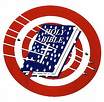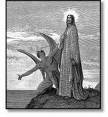It alarms me how many SBC churches and other denominations are jumping on the bandwagon of Rick Warren's "Purpose Driven Life" and doing the book study in their church. God's Word clearly gives direction and purpose for a person's life and can stand ALONE. It is the sole authority and all we need in this life. We do not need some book written by a HUMAN-BEING placed beside the Bible; like the Book of Mormon placed beside the Holy Bible. Please take time to read this article about Rick Warren and think again about the use of his books in your church. I hope you will sense the danger in how he is living before others. We at Truth or Consequences appreciate so much the writing of Chris Humphreys; this is an article written by him in December of 2005.
"Satan never did like making frontal attacks when he could squeeze in by the back door. He infiltrates, smuggling in an ounce of poisonous falsehood with a pound of scriptural truth. And what now is to stop him increasing the dose if a percentage of falsehood is permissible?" Victor Budgen
Mary Carey is a porn star that has created an uproar when she was slated to dine with the President at a GOP fund-raiser recently. Laying all political consideration aside, we have a 24-year-old actress, who, despite her racy occupation, claims she is still a Christian. Speaking to a WorldNetDaily reporter, she said, "I read the Bible and pray every night." She previously ran for California governor when the past governor, Gray Davis, was recalled, resulting in the election instead of actor Arnold Schwarzenegger. She is considering another bid, maybe this time around for lieutenant governor. She has aspirations for the Presidency one day.
With a Lutheran grandmother, Carey says she attended church regularly until the age of 12, and that "God reads my heart. I’m a good person. . .I think I have more morals than the politicians in office. I don’t rob, steal, hurt, or lie—a lot of politicians do that." When asked about Bible verses condemning adultery, she responded, "Bill Clinton committed adultery. Doing adult movies is acting, portraying a role. It’s not Mary, the real me." She maintains pornographic movies don’t harm anyone, and are beneficial in a way, providing safe fantasies for the "lonely" public.
Many Christians will probably respond with disgust at a woman like her who makes the claim that she is a Christian. Where Mary Carey went wrong (besides, of course, her lifestyle choices) is her failure to take advantage of a line of reasoning, by the (improper) use of a scriptural passage, which would give her more credibility in the eyes of lot of Christians. All she had to do was to seek cover by reciting 1 Corinthians 9:19-23, the motto of The Church of Almost Anything Goes. If you are not familiar with those verses by memory, here is what she could have said: "Well, you know the Bible says we ought to be all things to all men so that we might save some. The apostle Paul lived by that strategy, and so do I. I can reach fellow porn stars and people who watch these forms of entertainment if I stay in my profession as a Christian. To the Jews, Paul became like a Jew to win the Jews; to the Gentiles, he became like a Gentile to win the Gentiles. I become a porn star to win those in that lifestyle to Christ." Now had Mary Carey said something like that, she might have found a more favorable hearing from Christians.
Why not? Haven’t people used that passage in 1 Corinthians 9 to justify about anything under the sun? So how can we say that she would be wrong in using that passage to excuse her lifestyle, when we have given about everybody else, including high-profile megachurch pastors, the liberty to use that passage in that way? In the Church Growth Movement, we are told to be as innovative and creative as possible in order to "win people to Christ." That is why we have everything from Christian nightclubs to Christian tattoo parlors. I attended the Power Team Crusade (a group of male body-builders who perform enormous feats of strength) at a large Southern Baptist church in the Oklahoma City area over twelve years ago. Afterwards, I wrote a very short letter to the editor of the state Baptist paper, wherein I expressed my grief over what I had witnessed "all done in the name of Christ." After it was printed in the paper, I received many encouraging replies from others that felt the same way, but I did receive one letter that came as a shocker. It was seven pages long, typewritten, single space, from a Southern Baptist evangelist in Texas. It was the most hateful letter I have ever received in my life. In that letter, there was only one scriptural passage cited by this evangelist to justify what the Power Team or other groups do. Can you guess what that passage was? It is the motto of The Church of Almost Anything Goes.
This passage has absolutely nothing to do with the church being given a blank check by God to do anything it so desires to be culturally relevant and to be methodological savvy.
Paul had made it clear from the very start to the Corinthians (by the way, Mary Carey would feel right at home with the residents of Corinth) that such human wisdom was foolishness to God. He was determined to preach Christ and Him crucified which would save those who believe. Then he said in 1 Corinthians 2:1-5 that he came in weakness and fear and trembling (not like the flashy personalities with the bells and whistles of today’s hip church), knowing nothing except Christ and Him crucified. He didn’t come with lofty speech and plausible words of wisdom, but in "demonstration of the Spirit and of power, that your faith might not rest in the wisdom of men but in the power of God." If we depend upon market-driven, flesh-enticing strategies to draw people to our churches, then what assurance do we have that their supposed "faith" and "conversion" rests in the power of God alone, when instead it more likely rests in the wisdom of men?
So the apostle would not say something in 1 Corinthians 9 that would contradict what he said in chapters one and two. What may be the most butchered passage in all of God’s Word today is not talking about doing whatever it takes to reach a desired end. Reverend Pragmatic of The Church of Almost Anything Goes will say differently, of course, but God’s Word must be interpreted correctly. What Paul is advocating in this entire chapter is his giving up personal rights in order to reach different groups of people, all for the sake of the gospel. In fact, one need only go back to the previous chapter and read how this played out then in one certain burning first-century issue. As he says in chapter eight, we should not eat meat sacrificed to idols if it causes someone to be offended and to stumble by our carelessness and indifference. Let us give up our right to eat meat so that we will not put an unnecessary obstacle in someone else’s way in coming to Christ.
Missionaries give up personal rights all the time when they go to foreign countries and learn their language and begin to adopt some of their cultural ways in order to identify with the people. We don’t try to export Americanism overseas; we try to proclaim Christ, who is the Savior of Jews, Gentiles, free, slave, men, women, Americans, Asians, etc. Paul did that in the book of Acts consistently. He would go to a place of prayer by a riverside where Jews gathered in Philippi. He could go to a Jewish synagogue to preach, and he could go easily go to the Areopagus to preach to a group of pagan philosophers. He would argue passionately that man is saved by grace alone and not by the added circumcision. Yet, to give up personal liberties, and to ensure an easier access to a Jewish audience, he had Timothy circumcised. If a person who lives next door to me is a Muslim, that does not mean I need to become a Muslim to win the Muslim. What it may mean is that I may need to give up some personal liberties and try not to do things that would purposefully offend him culturally. But that does not mean that I give up the Word of God and what I believe to be true. And it doesn’t mean that I forsake the God-ordained means of saving folks—the faithful declaration of the Word of God, the entire counsel of God, the blessed gospel, which is the power of God unto salvation to everyone who believes.
Paul traveled all throughout the Roman Empire. Greek drama and theater were the big drawing cards for the populace. Never once do we see Paul lay aside the preaching of the gospel in order to draw people with a theatrical production, a stage play, or some other entertaining measures. He did not "become all things to all men" in that way. That is not what is meant in 1 Corinthians 9. The church has not been given a blank check to do whatever we dream up to entice a crowd to come hear what we have to say. God has already told us what to say and the means to say it. We can all improve in how we say it, but we don’t have the license to chunk the preaching and teaching of the gospel for some novel methods that may do a better job in getting a bigger crowd, but do a lousy job in making holy disciples of Christ.
When I was caught up in the Church Growth Movement in the mid 1980s, I came across a paper written by Rick Warren, pastor of the fast-growing Saddleback Valley Community Church in California. Out of this paper germinated many of the ideas that he formally organized in his book, The Purpose-Driven Church, which he wrote in 1995, and which book I am currently reading. This paper was entitled CAMEO, which stood for Contemporary Approaches to Ministry, Evangelism and Organization. I have discovered that Rick Warren has a fondness for the number five—five purposes of the church, five life purposes, five circles of commitment, SHAPE, and now recently PEACE, etc. (Maybe we should refer to each one of these as "the five points of Warrenism".) In this lengthy CAMEO paper, there were two passages cited. The first one was 1 Chronicles 12:32 which talks about the men of Issachar who had understanding of the times and knew what to do (hence, we should understand the shifting cultural trends to adapt the church accordingly, which is another corrupt interpretation of a biblical text). And can you guess by now what was the second passage cited, and for what purpose it was used?
In later articles, we will examine how all the Reverend Pragmatic of The Church of Almost Anything Goes will use both modern-day paraphrases, which greatly abuse the Word of God, and out-of-context verses. These corrupted versions, for example, provide convenient back-up support for what they do, because they can not find any support for their value system in a proper interpretation of the biblical text. Just by examining how they misuse the 1 Corinthians 9 passage shows us how terribly inept church leaders are becoming in interpreting the Word of God, and how equally undiscerning church members or Christians are becoming when they hear or read the Word of God sloppily presented.
Over 30,000 people filled the Angels baseball stadium in Anaheim, California, on April 17, 2005, to hear Pastor Rick Warren on the twenty-fifth anniversary of his church talk about his global PEACE plan to change the world. As reported in all news outlets, the parking lot was filled with tailgate parties, a children’s music concert, a motorcycle jumping exhibition and a jazz band. As Rick Warren got up to speak, he burst into singing Jimi Hendrix’s song, Purple Haze, a song about drug usage. The church band backed him up, and the crowd erupted in approving laughter.
We are led to believe, though, that we should not knock or criticize what Rick Warren did. After all, remember the motto of The Church of Almost Anything Goes. So efficient and adept are Rick Warren, Bill Hybels, Joel Osteen, Robert Schuller, etc., at what they do, that they have over the years earned their honorary doctorate degrees. They have advanced way beyond all the Reverends Pragmatic who dream of being as successful as Warren & Co. So when Dr. Free Pass does anything these days, he is given what his earned title suggests.
If someone were to ask Rick Warren twenty-five years ago-- "Do you envision yourself twenty-five years from now singing a song from the drug culture as an opening to a supposed worship service at your church gathering?"-- I’m pretty sure he would have given you the strangest look and strongest denial he could muster up. What happened over the twenty-five years? It’s the same thing that can happen to any of us—the more we cozy up to the world, given enough time, the less we seem to notice how cozy we are, how much like the world we have become. Added to that, we are much less bothered in how far we have drifted from our once simple and pure devotion to Christ.
But it goes way beyond just one song, as bad as that might be.
If someone also would have asked Rick Warren twenty-five years ago the following questions, I wonder what his response would be:
Will you one day talk about a global PEACE plan that has all the earmarks of New Age philosophy and old-fashioned religious liberalism in terms of a social gospel?
Will you speak at a National Pastor’s Conference in San Diego that will feature well-known prominent New Age teachers, and will open up with labyrinth and contemplative morning prayer exercises with yoga?
Will you freely associate with the likes of New Age teachers in the endorsements of books, and even personally writing the forewords to such books?
Will you solicit the services of a New Ager who seeks inspiration from Buddhism and who practices mantra meditation to help train leaders at your church in order to implement your global PEACE plan?
Will you talk glowingly about the benefits of "breath prayers", akin to Hindu yoga and Zen Buddhism, on day eleven in a best-selling book you will write?
Will you enlist known and practicing New Age specialists from a youth organization and a publishing house to help your youth to become familiar with contemplative spirituality?
Will you incorporate into your two best-selling books quotes from mystics, agnostics, heretics, evolutionists, and other anti-Christian, anti-biblical sources to build up support for your ideas in those books?
Will you gladly put on your church’s web site all sorts of endorsements and accolades from numerous secular news organizations and godless celebrities?
Will you look to a leading non-Christian business guru, known for his General Systems Theory, a merger of social Darwinism and eastern mysticism, to help you form your whole organizational model for church life?
Other questions could be asked, but you get the drift.
What would the answers be to those questions twenty-five years ago, if they were posed to Rick Warren? I don’t know myself, but it is food for thought.
One thing I do know for sure. Victor Budgen’s comment at the top of this article is so true. Satan tries to sneak in through the back door. (2 Peter 2:1) We help out matters a lot when we leave the back door unlocked. The church today has a remarkable level of toleration today for everything it seems, except the truth.
But what about the front door? My contention is that all the Reverends Pragmatic of The Church of Almost Anything Goes have encouraged us to leave the front door open to any new method, "so long it does not compromise the message (yea, right)". When I attended the Power Team presentation I had mentioned earlier, I was struck by how many times John Jacobs of the Power Team had to tell all the youth and children present not to come forward during the invitation time just so that they could be close to the Power Team. He must have said that at least a dozen times. Now why did he have to say that? Because he knew that most would probably come for that very reason. Why is it that all the Reverends Pragmatic and Drs. Free Pass talk so much about "how we can grow our church with all these new methods without compromising our message"? Because they know that man-made anything will trump God-made anything anytime, if we leave things to our own fleshly devices. That is the nature of the beast.
We may have opened the front door a tiny bit some years ago. How long ago is anybody’s guess. But it was so innocent and sincere, I am sure. But once you let King Pragmatism in, it sure is hard to close the door for anything else that comes along. And new things always seem to come along. After time, and after some success stories, we throw the door wide open to about anything. Hence, we have The Church of Almost Anything Goes. The entire fault does not reside with the Reverends Pragmatic; with our itching ears, we accumulate the Reverends we want around. We don’t see a huge gathering of concerned church members rushing to the front door to close it. If anything, they are quietly sitting by watching everything happen, or they are right there opening the door to any new strange idea that comes walking down the street.
The final result is that we have so opened the front door to our churches so wide, that there is not enough strength, willpower, and discernment left to close the door to anything. So much so, that maybe there is not a front door left on the church in many places. It has been taken off its hinges.
That is why a celebrated preacher with two best-selling books and with one of the largest churches in America can sing a song honoring an LSD trip in a supposed worship service with lots of audience laughter, instead of lots of mourning. (James 4:9)



























